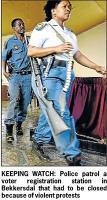
MOST people have been shocked by the land invasion, Zimbabwe style, by protesters in Uitenhage. Some are even outraged.
Perhaps they shouldnt be because all along the N2 nascent shanty towns in Plettenberg Bay, Knysna, George, Mossel Bay and Cape Town have been engulfed in a conflagration of protests, similar to those that have been ignited in Gauteng, the North West, Mpumalanga and Limpopo where land entitlement has become the common feature. Some of these protests, as in Bekkersdal, have reached insurrectionary dimensions.
Add to these events the strikes on the mining belt and the economic strikes by the trade unions, and one is compelled to ask: are these visible signs of the ruling parliamentary elite having lost control of the situation, not only in Uitenhage but all over the country? What are the options for the parliamentary parties: is there a viable short term solution?
When we have a system based on privilege, the privileged will protect that system by any means.
They will procrastinate, call meetings and make further promises until after the elections when they will force upon the masses the twin violence of “law and order”.
In the meanwhile low key action and a show of force will suffice to quell these spontaneous uncoordinated uprisings.
This has been the tactic of every ruling class since time immemorial.
As under the apartheid regime, the present ruling elite has maintained the system of racial capitalism. It has even gone as far as to promote ethnicity and tribalism.
Further, it has deliberately maintained the previous regimes system of divide and rule to maintain its hegemony, while the system of institutionalised poverty continues unabated.
Despite the declaration in 2008 that South Africa would be shack-free by next year, this remains an illusion in every city, town, dorp and village. It is estimated that the number of shacks is increasing by 140 000 annually as South Africas population increases.
In July-August we saw the annual storms wreaking havoc in the squatter camps in Cape Town, with the poor still suffering the ravages of spatial apartheid. Why, after 20 years of democratic rule, do we still have pit latrines and a lack of household piped water?
The question of housing is linked to land. Why, 100 years after the enactment of the nefarious SA Natives Land Act of 1913, do we have almost 90% of the land remaining in the hands of a tiny capitalist farming elite?
The act dispossessed the indigenous South African population of their land. This law and the laws enacted in 1936 set aside 7% (later 13%) of the agricultural land for black In my View Hammy Petersen South Africans. Thus the indigenous population was dispossessed of more than 90% of the land.
To a slightly lesser extent, this same situation circa 1913 remains, almost 20 years after the new South African government came to power. As is well known, the land acts were part of a capitalist-imperialist ruling class strategy not only to expropriate valuable property but also to create an ultra-exploitable proletariat mainly to serve as cheap labour for the farms, mines and burgeoning industry.
Prof Lungisile Ntsebeza, of UCT, and Prof Fred Hendricks, of Rhodes University, recently stated at a seminar at the South End Museum on the land question that at the present rate of transformation the government wouldnt resolve the land question for another 250 years, and, in addition, that the land question could not be totally resolved under the present constitution.
According to Wikipedia, South Africa has been dubbed the protest capital of the world. The situation in education, health and social services are all cause for service delivery protests.
However this description is probably inaccurate since South Africans anger encompasses a wider spectrum of concerns including government corruption (R32-billion), rampant crime, unemployment, police brutality, low wages, inadequate public transport and, of course, the land question. Peter Alexander, of the University of Johannesburg, has described uprisings in service delivery as the rebellion of the poor.
KEEPING WATCH: Police patrol a voter registration station in Bekkersdal that had to be closed because of violent protests
By Hammy Petersen
Source: The Herald newspaper
